#balekin greenbriar
Text
I just remembered that Balekin was the one who told Madoc where Jude and Taryn's mom was after she ran away from Elfhame. So Balekin's the reason Madoc took Jude, Vivi and Taryn back to Elfhame with him which indirectly caused Jude to kill Balekin all those years later. He would've still been alive if he weren't such a snitch lmao what a loser.
#bro really pre-ordered his own death without knowing it#jude duarte#cardan greenbriar#the cruel prince#cardan#jude#holly black#tfota#the stolen heir#oak greenbriar#the queen of nothing#the wicked king#jurdan#vivi duarte#taryn#taryn duarte#vivi#cardan x jude#jude x cardan#balekin greenbriar#balekin#madoc
437 notes
·
View notes
Text
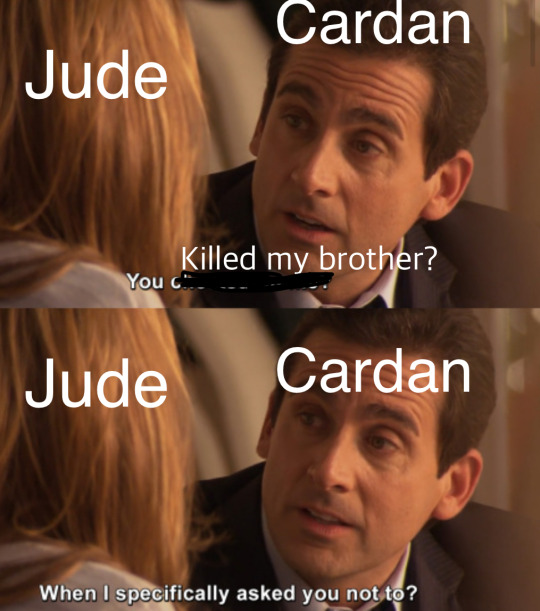
#Memes#tfota memes#tfota#the folk of the air#tcp#the cruel prince#twk#the wicked king#qon#the queen of nothing#cardan greenbriar#jude Duarte#balekin greenbriar
350 notes
·
View notes
Text
cardan at the family reunion

#cardan greenbriar#the cruel prince#the wicked king#the queen of nothing#the folk of the air#tfota#balekin greenbriar#dain greenbriar#i don't remember the names i'm sorry#tfota memes#holly black#holly blacj#the court of shadows#<3
395 notes
·
View notes
Text
Cardan: Jude where have you been
Jude:

#the cruel prince#the wicked king#the queen of nothing#jude duarte#cardan greenbriar#balekin greenbriar#jurdan
178 notes
·
View notes
Text
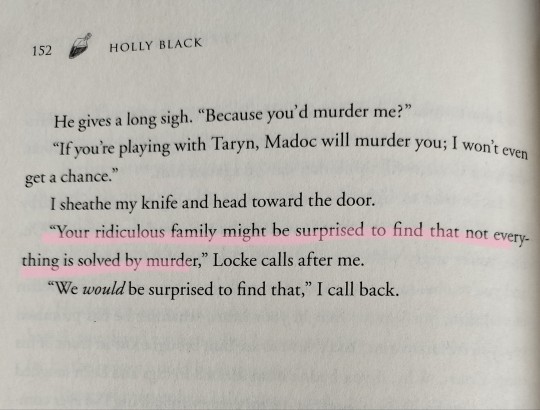
Locke waking up in some afterlife to Valerien, Dain, Balekin and so many others killed by the Duartes/Madoc's family chanting " One of us. One of us "
#fyp#the folk of the air#jude duarte#the cruel prince#the queen of nothing#the wicked king#holly black#locke#balekin greenbriar#dain greenbriar#Valerien#madoc#one of us one of us
132 notes
·
View notes
Text

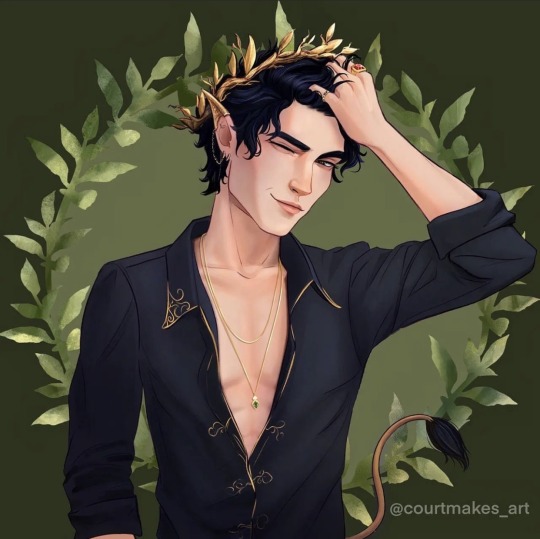

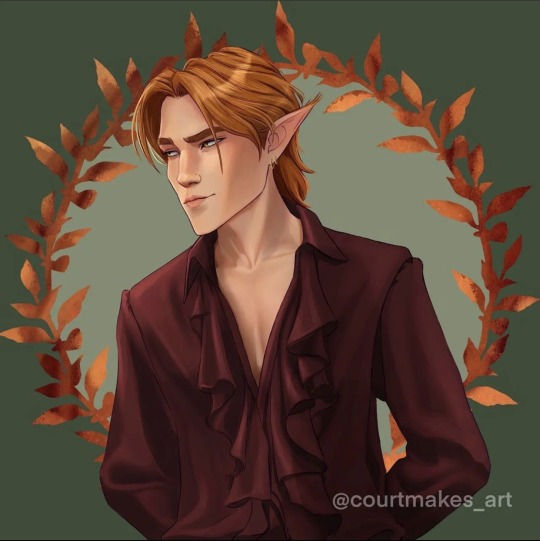
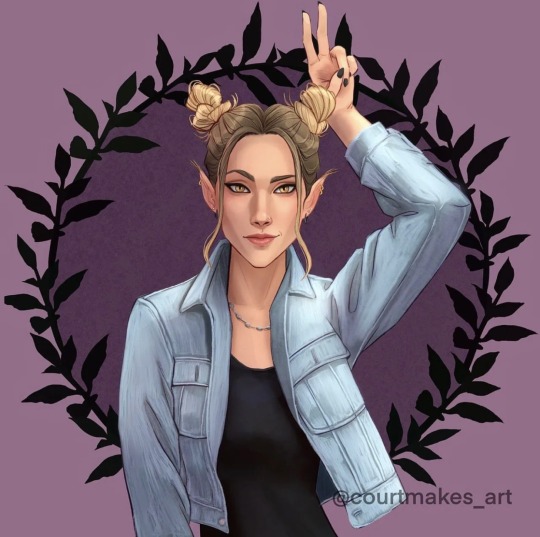
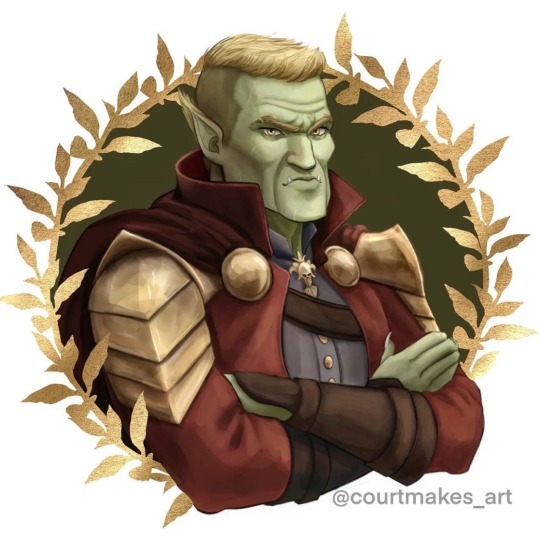



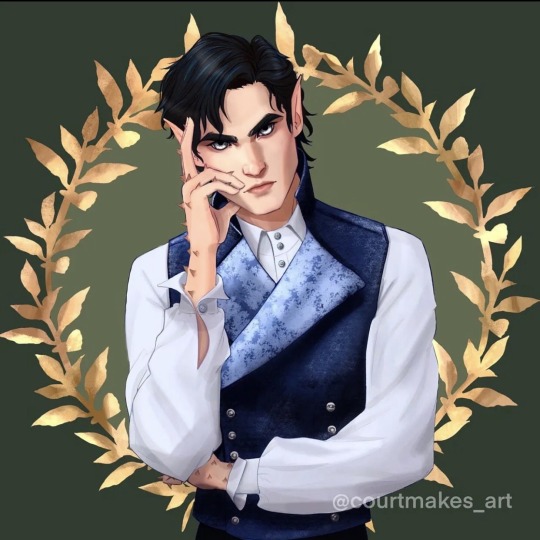
The Cruel Prince Characters
Artist: @courtmakes_art
#jurdan#jude duarte#cardan greenbriar#nicasia#locke#vivienne duarte#vivi#madoc#the bomb#the roach#the ghost#balekin greenbriar#tcp#the cruel prince#tfota#holly black#larkin gorm garret
315 notes
·
View notes
Text
Balekin:
'"Mortal girl," Balekin says one afternoon when we're alone in the watery chambers of the palace. He does not like using my name, perhaps because he doesn't like having to recall it, finding me as disposable as all the human girls who come through Hollow Hall.'
Cardan:

#parallels#dramatic music was playing in my head as i made this#miss holly black you are a genius#the wicked king#queen of nothing#the cruel prince#the folk of the air#cardan greenbriar#jude duarte#jurdan#tcp#qon#twk#holly black#balekin greenbriar
338 notes
·
View notes
Text
Theory: Eldred is not Cardan's father
Listen. I don’t know if anyone has said this before, but I’ve been mulling this over for a while now, so I’m going to throw it to the void before The Stolen Heir comes out, for posterity.
Buckle up, folks and Folk. I’m monologuing.

(PLEASE DO NOT INCLUDE TSH SPOILERS IN THE COMMENTS/REBLOGS/TAGS AS I HAVE NOT READ IT, AND WILL NOT BE ABLE TO READ IT UNTIL 8th JAN 2023!)
A big caveat of this theory is that I have basically no solid evidence for this apart from a few faint dots vaguely connected through a strange fog. But I am nothing if not someone who will scrounge around in the dirt for answers. So let’s get some filth under our fingernails.
(I promise it will maybe make sense. Eventually)
I. EPISTOLARY SEMANTICS
Much of this theory centres around the note Jude steals for Dain from Hollow Hall in The Cruel Prince. It reads:
“I know the provenance of the blusher mushroom that you ask after, but what you do with it must not be tied to me. After this, I consider my debt paid. Let my name be stricken from your lips.” (TCP, p.115)
There are so many layers to this note, but I’ll start on the surface level before digging deeper.
When Jude gives the note to Dain, he reads it, then says, “So he’s blackmailing Queen Orlagh” (TCP, p.123). During a first read, one would think Dain is implying that Balekin is blackmailing Orlagh, since Jude stole the note from Balekin’s study, and that Orlagh is the one who wrote the letter to the eldest Greenbriar child.
And no one questions it, because Jude even makes this supposition herself.
But my question is this: Why would Balekin be blackmailing Orlagh? We learn in The Wicked King that they are very much allies, and as far as I’m aware, blackmailing isn’t something you typically do to your allies.
My other question is: Why do we assume that Orlagh is the one that wrote the letter? Because Dain said so? We know him to be unreliable at best, manipulator at worst.
During a second read, one might realise that Dain is in fact being tricky here. He knows exactly who and what this note is referring to. But he’s deliberately trying to lead the Court of Shadows to the wrong conclusion, because the right one would reveal his guilt, as shown in the latter part of The Cruel Prince when Jude figures out Dain poisoned Liriope with blusher mushroom.
The way Dain is able to lead us off track without lying is through implication alone. This is why he’s not specific about who is blackmailing Orlagh. He just says someone is (a likely statement, considering Orlagh’s title) and that someone might be a man (plausible enough).
Thus, the sentence “He’s blackmailing Orlagh” can still be a perceived truth, and we are only ascribing it to the note because it is the closest context.
But we find out later that Dain’s statement has nothing to do with the note, since the note is about Liriope’s poisoning.
After having read TCP [redacted] times, one might begin to think: Is Orlagh even the sender of this correspondence? And if not, who is? And what does the note mean if we’re giving it a different context/sender?
For this, we have to peruse the parts of the sentences written in the note.
A. “Provenance”
For me, this phrase has always seemed a bit strange when referring to blusher mushrooms.
The word “provenance”, as most people recognise it, is used to describe the place from which a particular thing or subset of things comes from (i.e. the provenance of “Champagne” is Champagne, France, and the provenance of “Iranian rugs” is Iran, etc.).
So when we put it in the context of blusher mushrooms, as the note does, it seems to be saying there is a particular place where one can find blusher mushrooms, and the recipient is trying to acquire them for one reason or another.
But Jude, when first dabbling in mithridatism, describes picking blusher mushroom in the palace gardens (p.148-150, TCP). So if Balekin was planning on acquiring the poison, he needn’t look farther than the palace itself.
Which says, to me, that acquiring blusher mushroom for his own purposes wasn’t the subject of Balekin’s original inquiry, since it is common enough for a seventeen-year-old girl to find on her walk to school.
Additionally, the sender says “the provenance of the blusher mushroom”, when “the provenance of blusher mushroom” would be more grammatically correct if the sender was indeed informing Balekin about where he could get the poison.
Implying that they are referring to a single specific blusher mushroom. Perhaps, the very one which poisoned Liriope.
Which means, “provenance”, as it is used in the note, could be referring to the less common definition: “record of ownership”.
My guess is, Balekin asked the sender of the note if they knew who killed Liriope with blusher mushroom. The sender, wanting to remain cryptic in case the message was intercepted, phrased their confirmation so only the person who knew the full context of the message would be able to understand it.
Leading me to believe the sender may be saying, “I know who owned/used the blusher mushroom that you’re asking about”.
B. “It”
Here’s another tricky thing about English grammar: sometimes the subject that “it” refers to can be a group of things.
We might assume right off the bat that “What you do with it” means “What you do with the blusher mushroom”. But, given the previous specification, our sender might actually just mean “What you do with this information must not be tied back to me.”
Essentially, “Don’t tell anyone I told you this but I know who Liriope’s murderer is.”
C. “Let my name be stricken from your lips.”
To me, this last sentence of the note wreaks of faerie bargain.
The sender mentioned they had a debt to pay Balekin, and after divulging who poisoned Liriope, they would consider that debt paid.
But why not just leave the message at that? They already basically said, “Don’t tell anyone I told you this”, so this sentence seems redundant if not included for an ulterior purpose.
It could be a dramatic sign off. More likely, though, it’s a final clause of some bargain made previous to this message. Such as, “You owe me. Tell me who poisoned Liriope and I’ll never speak your name again.”
Either way, it sounds like the sender does not want to be tied to Balekin in any way (understandable tbh).
***This line is important for later, so remember this.***
~~~
So, after these specifications have been made, the note reads:
“I know who owned/used the blusher mushroom to poison Liriope, but what you do with this information must not be traced back to me. After this, I consider my debt paid. As per our bargain, you’re not to speak of me again.”
II. THE SENDER OF THE LETTER
There are many people who could’ve sent this letter. So let’s narrow it down.
Since the letter is in Balekin’s study, we could surmise that it is something Balekin has written and plans on sending. But Jude describes it as being written in “an elegant, feminine hand” (TCP, p.115).
Which doesn’t necessarily rule Balekin out as the sender, but I’m thinking it is much more likely he is the recipient, and that the sender is a woman.
The sender also knows who killed Liriope, so they probably know why Liriope was poisoned, as well. Meaning, they would have had to have ties to her—whether in proximity or in intimacy.
Oriana mentions in TCP that she and Liriope were close friends. She also tells Jude that she knew about Liriope and Dain’s affair.
However, in this same conversation, Jude asks Oriana if she knew Dain was the one who poisoned Liriope, and this is her response:
“Oriana shakes her head. ‘Not for a long time. It could have been another of Eldred’s lovers. Or Balekin—there were rumours he was the one responsible. I even wondered if it could have been Eldred, if he had poisoned her for dallying with his son. But then Madoc discovered Dain had obtained the blusher mushroom. He insisted I never let Oak be anywhere near the prince.’ ”(TCP, pp. 294-295)
Since faeries cannot lie, the truth must be that Oriana is not the one that knew who poisoned Liriope.
And since the letter is left unsigned, Dain attributes its origins to the Queen of the Undersea.
Here’s why I don’t think Orlagh sent this message:
Orlagh is seen in cahoots with Balekin plenty throughout the series. Yet, the sender of this message implies they want nothing to do with the eldest prince, and furthermore explicitly tells Balekin to never speak their name again. If Orlagh were the sender of this note, we would not have much of the scenes which take place in the Undersea during Jude’s kidnapping in The Wicked King.
Orlagh is the Queen of the Undersea. Why would she know or care about the details of a murder of one of the High King of Elfhame’s lovers?
Orlagh also has no ties to Liriope, or Dain for that matter, so why would Balekin go to Orlagh for information regarding Liriope’s murder?
But do you know who does have ties to Liriope, who might also have reason not to want Balekin to speak their name ever again?
Lady Asha.
So how exactly does Lady Asha have ties to Liriope?
It is common knowledge that they were both lovers of the High King. Asha could’ve known of Liriope’s affair with Dain because of their proximity at court. She was also known for being a lover of gossip and secrets. It’s not too surprising that she might know of Liriope’s secret.
But how does Lady Asha know that Dain specifically poisoned Liriope? And why might she want to sever her ties with Balekin?
Let me back track for a moment.
III. EMERALDS FOR HEIRS?
In the prologue of The Queen of Nothing, Lady Asha receives a heavy necklace of emeralds for her “contribution to the Greenbriar line”.
In The Cruel Prince, when Jude is dressing in Liriope’s clothes for the party at Locke’s estate, Locke offers her his mother’s jewels, specifically a heavy necklace made of emeralds (TCP, p. 168).
At first, when I noticed this connection, I thought emeralds must be Eldred’s standard gift given to any mother who births a Greenbriar heir.
But if you recall, Locke wasn’t born to Eldred, and Liriope would have had to receive the necklace while she was still alive, meaning Oak had not yet been born.
It is significant that both of these women have necklaces of emeralds, for the meaning of emeralds—amongst loyalty, love, and strength—is truth.
“A revealer of truths, emerald reputedly could cut through all illusions and spells, including the truth or falsity of a lover’s oath.” (International Gem Society)
Indeed, it’s curious that the only other person known to possess a string of emeralds similar to the one Lady Asha receives in QON, is Liriope.
Liriope, who, to common knowledge, never had a royal child with the High King. Liriope, who, through the events of TCP, we know to have been having an affair with Dain while still in the High King’s favour.
Liriope, who, like Lady Asha, met an unfortunate fate.
If emeralds represent the falsity of a lover’s oath, and Liriope possessed such a necklace before her passing, it could be that the emeralds Asha received were less a gift as much as they were a warning.
One that Asha was either too arrogant or too oblivious to figure out when she first received them, but that she might've pieces together after Liriope's death.
IV. PUNISHMENT BY PROXY
In the prologue of Queen of Nothing, the narrator informs us that Cardan’s punishment for “killing” a mortal man was that his mother was locked in the Tower of Forgetting.
It’s unsurprising that a mother should shoulder the blame for the crimes of her royal son, but this seems like a steep price to pay for the death of someone only tangentially related to the High King’s concerns.
It wasn’t even a lover of Eldred’s own who was killed. It was the lover of his lover/seneschal.
Incarcerating Asha because her son allegedly killed the lover of the High King’s lover feels like an overreaction. Why not simply cast Asha from the court? Or send her to the mortal lands?
Unless…
The High King suspected (or knew) that Lady Asha had committed some other serious offense against him, but had no sufficient evidence to lock her away. Or perhaps he did not want to risk the humiliation that would ensue if everyone at court found out that Lady Asha had been dallying with his son at the same time as she was his own lover.
And, to give her what he thought she deserved without inciting speculation from the court, used the excuse of Cardan killing the mortal to finally serve justice.
Furthermore, we know Cardan and his mother were not close. We know Asha did not raise Cardan as normal mothers do. Why is sending Cardan’s mother to prison a punishment to him?
Other than a small blot on his reputation (upon which, there are many, much larger blots), Asha’s punishment by proxy largely shouldn’t effect Cardan.
It seems as if Cardan’s true punishment was being virtually disowned by his father, and banished from living in the Palace of Elfhame.
Meaning, Asha’s punishment wasn’t really Cardan’s, but her own.
V. THE DEBT
In the letter Jude stole from Balekin’s desk, a “debt”, which has been paid through the information provided, is mentioned. If Asha sent this letter, what debt could she possibly owe Balekin?
Well, for starters, he did raise her son when no one else would.
Though, it’s unclear to me when in the timeline Asha wrote the letter and when she was imprisoned, if this is the aforementioned debt, Asha would’ve had to have written the letter after she’d been sent to the Tower of Forgetting. Because her being sent to the Tower was the catalyst for Balekin raising Cardan.
This debt also begs the question: Why would Balekin offer to raise Cardan?
Surely having Lady Asha, an incarcerated ex-lover of the High King, in his debt isn’t so valuable as the immense responsibility of raising a child he has no obligation to.
Which points to a motive that indicates perhaps Balekin does have an obligation to this child.
When Madoc kills Eva and Justin in the prologue of TCP, he takes Jude and Taryn in, claiming it as his “duty” after he rendered them parentless. We know the fae value their honour, and so even someone as opprobrius as Balekin might be subject to upholding duty in the face of a faerie child’s mother being sent to prison.
But as we know, he did not cause Lady Asha’s detainment (Dain did). So where is this sudden sense of duty coming from? None of the other Greenbriar siblings seemed to have the same moral inclination.
Balekin taking Cardan in could be purely out of selfish motives. Such as, being able to shape Cardan to his will, which he might then use in a potential coup.
But it could be that, through everything, Balekin has an inkling of an idea that Cardan might not be his brother, but his son.
There is another debt which is possible in relation to the letter if it was sent prior to Lady Asha’s imprisonment. But for this, we must consider why Lady Asha would want her name to be stricken from Balekin’s lips in the first place.
The most obvious answer to this which I could think of is that Lady Asha knows she has committed treason by sleeping with Balekin, the High King’s son, and claiming their child as one of the High King’s own, staking her place at court as higher than is deserved, while also playing the High King for a fool.
So the debt could simply be that Lady Asha, seeing what happened to Liriope and knowing what happens to lovers of the High King after being found adulterous, wanted Balekin to never be able to speak of their affair ever again.
Balekin, not being of the sort to do things for other people without a price, might have said that he’d agree to this if she offered him information that he wanted. After she gave it to him, their bargain would be complete, and Balekin would henceforth never be able to speak Lady Asha’s name.
Regardless of which debt is the truth, indeed, I do believe we do not hear Balekin utter Asha’s name once throughout the course of the series. Despite the fact that it is almost certain they knew each other before.
VI. PRIOR ENTANGLEMENT
How do we know that Asha and Balekin knew each other well enough to be sending letters like this back and forth to each other, if we are not yet certain that they had an affair?
In the prologue of TCP, Madoc states that he didn’t believe it when Balekin told him his wife and child were not dead, but living in the mortal world. This indicates that Balekin had knowledge of how Eva faked her death.
Now, we could owe this to the presence of spies at court. It’s likely that Balekin has his own hoard of spies, as do most of the prominent figures in Eflhame.
Or we could consider that perhaps Lady Asha, who is the other person confirmed to have known that Eva faked her death (TWK, p.129), was Balekin’s informant on this matter.
After receiving this information, he was then able to pass it on to Madoc in order to gain his trust (with the ulterior motive that Madoc might trust him enough to help him with his coup).
But then, we must also consider why Lady Asha would tell the eldest prince of her friend’s plan in the first place.
One thought I had was that perhaps Balekin, having a slew of mortal servants under his roof, was the person who offered Eva the unidentifiable mortals left in Madoc’s house as “proof” of their death.
He’d have to have motive to do this, however. Which indicates he either had some sort of attachment to Asha, who was trying to help her friend escape Faerie, or Balekin valued the knowledge of their plan enough to help them carry it out.
Another less complicated motive for Lady Asha telling Balekin of Eva’s escape would be that Asha and Balekin had a history of being in cahoots with one another, which would point to a connection deeper than a passing acquaintanceship due to proximity at court.
VII. AN UNCANNY LIKENESS
It is a truth in The Folk of the Air series that children look very much like their biological parents.
Oak, biological son of Dain, looks an awful lot like Dain:
Oak is described as having deer legs, little horns on his head, and brown hair with streaks of gold.
Dain, in turn, is described as having deer legs, little horns, and golden curls.
This striking resemblance is what initially got me thinking on Cardan’s parentage. And it is further backed by the many other child-parent resemblances in the series:
Vivi is described as having inherited her father’s golden cat eyes and fur-tipped ears.
Locke has obviously inherited his mother’s “sunrise hair”.
And it could be argued that Oak inherited Liriope’s “starlit eyes”, as his are an amber-gold colour that might resemble an old star.
Lady Asha even states that Jude resembles both Eva and Justin greatly (TCP, p.129).
And in kind, Jude thinks that Lady Asha and Cardan look very alike, though she does not admit to this out loud.
These likenesses do not necessarily indicate anything other than a pattern, which could be total coincidence. But it does mean that we could reasonably conclude that faeries, as with humans, often take on characteristics of their parents.
Balekin is described as having black hair, pale skin, and silver eyes.
Cardan’s description in the series is quite similar:
He is said to have black curls, pale skin, and metallic-rimmed black irises.
When we compare that to Eldred’s description—golden hair and bronze owl-like eyes—it doesn’t seem like Cardan inherited many traits from the High King at all.
Now, this could be because Lady Asha’s characteristics were more dominant in Cardan’s inherited genes.
She is described as being pale, with raven hair, and black eyes. She also clearly passed her tail on to her son.
But the similarities between Cardan and Balekin go beyond the obvious. When Jude is hiding under a chair in Balekin’s study, she notices the following:
“In two strides, Balekin is in front of his brother. They look so alike standing close. Same inky hair, matching sneers, devouring eyes.” (TCP, p.119)
Indeed, this resemblance is echoed across the series. In The Wicked King, when Jude goes to visit Balekin in the Tower of Forgetting, she states:
“As I ascend, I glance back at Balekin’s face, severe in the green torchlight. He resembles Cardan too much for my comfort.” (TWK, p. 26)
And again, in the Undersea, when Balekin comes to interrogate her, Jude thinks:
“They have the same black hair. The same cheekbones.” (TWK, p. 240)
There is also the matter of Cardan’s name, which bears resemblance to Balekin’s physicality.
Balekin is described as having thorns on his forearms. Cardan is a name which is derived from Cardon, which means thistle. Thistles are a prickly flower that grow from stems of thorns.
We know Holly Black is very intentional with her descriptions and words. My question is, why would she go out of her way to draw these physical comparisons, to echo the sentiment that the two are strikingly similar, if Cardan and Balekin were merely brothers?
She could have said that Cardan, being raised in Balekin's household for much of his formative years, was moulded to adopt his brother's mannerisms and propensity for cruelty. She could have said the way that they talk, walk, carry themselves, etc. were extremely reminiscent of one another, and we as readers would've gotten the point: that Jude thinks Cardan and Balekin are alike in many ways.
But this isn't what Holly Black does. Which leads me to believe there is something else to the constant parallels she chooses to include.
VIII. IN CONCLUSION
I’m aware this entire post reads like a conspiracy theory. So to those of you who stuck it out this far, congratulations and welcome to the circus.

I’ll be the first to admit that it is a big reach to say that this is fact rather than the speculation that it is. There are a lot of holes, which I can only hope might be filled in the coming duology.
That being said, this theory brings many questions to light.
How would Balekin know of Eva’s escape without having a more intimate relationship with her friend than previously thought?
Why would Lady Asha want her name stricken from Balekin’s lips so desperately as to make a bargain with him?
How could Lady Asha possibly be indebted to Balekin?
Why would Liriope and Asha be the only two characters with heavy necklaces of emeralds on their person if it didn’t mean they shared a similar history with the High King?
Why would Holly Black continuously compare Balekin and Cardan, indirectly pointing out that neither look much like their father or other siblings, but look undeniably like each other, if not to draw a deeper connection between the two?
And finally, and perhaps most importantly, if Lady Asha’s dalliance with Eldred was so brief—as is confirmed by Oriana in chapter 12 of QON— how did she come to be pregnant by him? We know faerie menstrual cycles don’t happen as often as mortals’.
Is this as simple as good luck, or does it speak to an affair no one knew was happening?
–Em 🖤🗡
more theories & analysis
#this is. complete speculation ngl gvskdjsk#i have a whole conspiracy theory red string board for this one though#tfota#jurdan#cardan greenbriar#jude duarte#balekin greenbriar#lady asha#the folk of the air#jurdannet#the cruel prince#the wicked king#the queen of nothing#queen of nothing#holly black#judecardan#how the king of elfhame learned to hate stories#tfota meta#tfota analysis#my analysis
861 notes
·
View notes
Text
the folk of the air au stardust style where all eldred's dead children hang out in the afterlife eating popcorn and doing bets on the shit that will happen
balekin's death in a nutshell

#he will certainly have an unpleasant conversation#please i love them in this movie#they're just silly little guys#i need the end of the wicked king particulary#tfota reread#tfota#the folk of the air#the cruel prince#the wicked king#the queen of nothing#cardan greenbriar#jude duarte#balekin greenbriar#i ain't tagging all that#holly black#stardust movie#stardust#tristan thorn
52 notes
·
View notes
Text

Quick sketch of Balekin!
I always imagined his aura being blue, Cardan's plum and Jude's dark red. I'm currently re-reading The Wicked King so I got inspired
#balekin greenbriar#balekin#judeduarte#cardan greenbriar#holly black#the wicked king#the cruel prince#the queen of nothing#the folk of the air#faery#book fanart#illustration#jude x cardan
29 notes
·
View notes
Text
cardan: “Jude Duarte, do you deny you murdered Prince Balekin, Ambassador of the Undersea and brother to the High King?”
jude:

#cardan greenbriar#jude duarte#jurdan#the cruel prince#the wicked king#the queen of nothing#the folk of the air#tfota#balekin greenbriar#tfota memes
187 notes
·
View notes
Text
Everyone at the coronation:

#the cruel prince#folk of the air#balekin greenbriar#jude duarte#cardan greenbriar#jurdan#the queen of nothing#the wicked king
70 notes
·
View notes
Text
If I have to compare the Duarte sisters to the Greenbrier brothers I would have to say Vivi is Cardan, Taryn is Dain and Jude is Balekin...
Vivi and Cardan are the chaotic wild child, they (mostly) do what they want when they want to. Jude and Balekin are people that you do not want to mess around when you know their reputation. Taryn and Dain on the other hand have crafted their mask to deceive others and themselves of how awful they can be
#fyp#the folk of the air#cardan greenbrier#jude duarte#the cruel prince#the queen of nothing#jurdan#the wicked king#ao3#vivienne duarte#taryn duarte#dain greenbriar#balekin greenbriar#comparison
140 notes
·
View notes
Text
Balekin joining his family in the afterlife:

70 notes
·
View notes
Text
youtube
The devil speaks through hearts left yearning.
He can’t tell lies but sings wicked euphonies.
Below the hills, there lies a chasm
Holding valleys of phantasms.
Have ya'll heard this Folk of the Air song that I wrote? I managed to gently persuade by friend @victoriacarbol to sing the Balekin part to my Cardan in my third Toxic Families in Faerie song. DOESN'T SHE SOUND AMAZING? Anyway, you can watch this lyric video or stream this bad boy on the Bookish Songs Collective's Folk of the Air album Under the Hill.
#the folk of the air#tfota#cardan greenbriar#balekin greenbriar#victoria carbol#bookish music#the cruel prince#the wicked king#the queen of nothing#music#Youtube
34 notes
·
View notes
Text
Not the normal Cardan being horny, but I like this paragraph
After a moment of silence, we both erupted in loud and obnoxious laughter. There was no way in hell that the crown would ever fall on my head. My father resented me, my brothers were worthier, and my sisters were wiser. I was the youngest, the mistake. I was also the one with the horrible prophecy hanging over my future. Not that Nicasia knew about that.
#cruel prince#tfota#cardan greenbriar#folk of the air#cardan#fanfiction#ao3#nicasia#dain#balekin greenbriar
48 notes
·
View notes